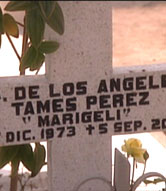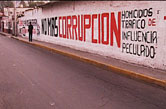By Ricardo Sandoval
September 5, 2002
Rene Perez, a clerk at a downtown car rental counter in Tijuana, Mexico, grew apprehensive as police recently approached the door of his house in this rough-and-tumble border city.
Citizens interacting with police is hardly news. But this is Tijuana, an anything-goes city of 2 million and ground zero for North America’s long problem with illegal drugs. Ruthless gangs here fight each other and the authorities over dibs on lucrative international trafficking routes for cocaine, heroin, marijuana and methamphetamines. Their allies: police compromised by millions of dollars in bribes, or intimidated by years of violent retribution by drug lords.
Yet the cops who swooped down on Perez had a much more mundane mission: returning a wallet snatched by a mugger and found at the scene of a subsequent drug shootout. Marvels Perez: “[The police] were actually investigating the crime.”
What Perez witnessed experts believe is the start of a sea change for Mexico. The anti-trafficking and anti-corruption reforms of Mexico’s maverick President Vicente Fox are taking root, even in places like Tijuana.
Unlike his administration’s more mixed human rights record, it’s the fight against drugs and corrupt officials where Fox can truly point to progress. In taking on this task, the president wields a key weapon: the Mexican military.
“The Mexican military is like a broad-spectrum antibiotic that’s being used now in Mexico to cure a variety of social infections,” said Oscar Rocha, a former liaison between the Mexican and U.S. militaries. “Unlike any other Latin American nation today, to see the military on our streets doing police work . . . is not a bad thing.”
The military’s influence can be found throughout this reform-minded government. Fox’s Attorney General, Rafael Macedo de la Concha, was previously the military’s chief prosecutor. Ranking Army officers and intelligence agents have also trained most of Mexico’s new – and so far clean – Federal Preventive Police and the Federal Investigations Agency, which mimics the FBI.
Fox has marshaled elite teams of Army commandos – probably Mexico’s least-corrupt law enforcers – into reliable narco-hunters who’ve moved quickly against several drug lords, with guidance from U.S. intelligence.
It was a cadre of these commanders who scored Fox’s crowning achievement to date: the beheading of Tijuana’s Arellano Felix organization, the richest and meanest of Mexico’s ubiquitous drug cartels.
In a lightning raid last spring, Army commandos nicknamed the “snake eaters” arrested Benjamin Felix, brother of the cartel’s late enforcer, Ramon Arellano Felix. The raid was so secret that the commandos didn’t know their target until they were en route. Corrupt police had blown previous raids against drug lords.
But military analysts fear the military is being spread too thin. Besides fighting drugs, the Mexican Army today does everything, from cutting hair in poor Mexico City neighborhoods to planting millions of trees in national forests.
There’s concern that as long as the military works well as Mexico’s police force, Fox won’t move fast enough to fix civilian police institutions. And the longer soldiers are exposed to the drug scene, the harder it might for them to resist bribery.
Crime experts admire the Mexican military’s loyalty to whatever civilian authority is in place – a rarity among Latin American armies. But in recent years there have been flashes of spectacular corruption among military leaders: three former generals – including the nation’s former drug czar – are in jail on drug-corruption charges.
And despite the Arellano Felix organization’s downfall – and the arrest of dozens of other narcos – illicit drugs still flow across the border. The problem remains so bad that the U.S. Drug Enforcement Administration has assigned 17 more agents to the Mexican border.
There’s also a nagging fear among American anti-drug agents that the Fox team might be slacking off after the score against the Arellano Felix brothers.
Nor is the military equipped to assist Fox with Mexico’s other longstanding bugbear: human rights. Though the president has ushered human rights advances into Mexico – like freeing environmental activists and accused indigenous rebels – he can’t escape the fallout of the probable murder of Digna Ochoa, one of Mexico’s most effective human rights lawyers. His much ballyhooed promise to investigate Mexico’s “Dirty War” – past government repression of student and political dissenters – has shrunk to a largely symbolic de-classifying of some intelligence and police records. There are also reports of continued torture at the hands of authorities, and sporadic disappearances of rural activists since Fox came to office two years ago.
Still, U.S. officials are convinced Fox’s reforms have had an impact. And average Mexicans tell pollsters they back his work, figuring it will take time to undo a bird’s nest of corruption, cronyism and criminal complicity created by the PRI.
“I have noticed a change in the attitude of public servants since [Fox] won,” said Rene Perez in Tijuana, as he walked around a car he was about to release to an American tourist. “Clean cops and a safer city will be good for my business … I can only hope it lasts.”
Ricardo Sandoval is an award-winning Latin America correspondent, based in Mexico City, for THE DALLAS MORNING NEWS. He’s also co-author of “The Fight in the Fields: Cesar Chavez and the Farmworkers Movement,” published by Harcourt Brace. He previously worked as an investigative business reporter for THE SAN JOSE MERCURY NEWS and THE SAN FRANCISCO EXAMINER.



